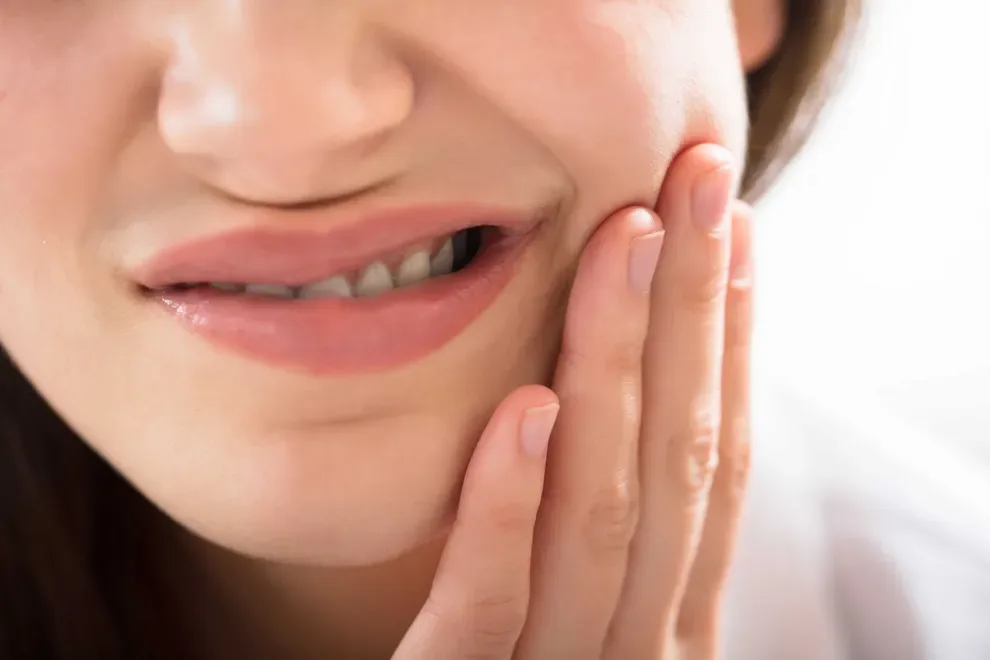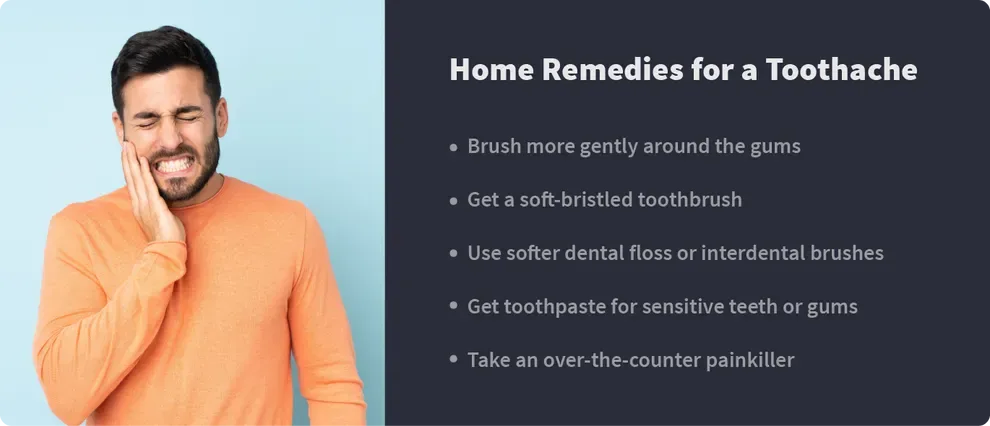At-Home & Natural Toothache Remedies: What Actually Works

Table of Contents
- Worrying Symptom or Easy Problem
- At-Home Remedies
- Natural Remedies
- When to See a Dentist
- References
For a toothache, over-the-counter pain relief, compresses, and special toothpastes and toothbrushes can help. At-home and natural remedies generally work best for mild tooth sensitivity, discomfort, or pain.
If these natural remedies don’t work, it can be a sign of a more serious issue, and a visit to the dentist is warranted.
Toothaches: A Worrying Symptom or an Easy Problem to Manage?
Toothaches are common occurrences, but if you develop one, you should determine what is causing the pain. Sensitive teeth can be a sign of tooth decay or damage.
You may grind or clench your teeth, especially in your sleep, without realizing it. You might brush your teeth too hard, causing damage to your gums. These issues are fixable with a combination of home remedies and a trip to the dentist.
There are several ways to manage toothaches at home. These remedies are not a substitute for professional care from a dentist, especially if the pain does not go away or gets worse.

Remedies for Toothaches You Can Do at Home
Toothaches might be caused by sensitivity, which can be due to thinning enamel or brushing near your gums too hard.
Here are some steps you can take at home to reduce sensitivity:
Some electric toothbrushes have a setting that brushes more gently against your teeth and gums, which can reduce tooth sensitivity over time. You can also carefully and slowly brush your teeth, being cautious to brush for longer but with a lighter touch.
If you have a toothbrush with tough bristles, consider getting one with thinner or softer bristles. Specialty toothbrushes for sensitive teeth and gums might work better for you.
If sensitive or receding gums are causing routine tooth pain, consider getting dental floss that is designed specifically for sensitive teeth or using softer interdental brushes rather than dental floss. Some medical research shows that interdental brushes are more effective at reducing plaque and tartar between teeth compared to dental floss, and they are gentler on sensitive gums.
Your dentist can recommend a type of toothpaste to either protect and rebuild your enamel or to manage tooth and gum sensitivity. There are several brands available. Depending on the underlying cause of your occasional toothache, you may be more suited for one brand compared to others.
Ibuprofen and acetaminophen are excellent OTC pain relievers since they both reduce the sensation of pain and inflammation that may be associated with pain. If the toothache returns when the painkiller wears off, you may have a more serious issue and should contact your dentist for help.
These minor adjustments to your dental care routine, along with an occasional pain reliever, can be very helpful if you have sensitive teeth or gums, which are two of the most common causes of toothaches. If pain does not go away or gets worse, visit your dentist to make sure there is no underlying infection or damage.
Toothaches that continue for more than two days or that worsen should be examined by a dentist.

Natural Remedies to Ease Toothache Symptoms
Many people prefer natural remedies for minor aches and pains, so they can manage their overall health and well-being at home.
If you develop a toothache that is not manageable with changes to support sensitive teeth and gums, you may have an infection or damage to your teeth that your dentist will need to inspect.
Sometimes, you may have ongoing discomfort after a dental procedure. If pain from a dental procedure does not go away, you should speak with your dentist to make sure there is no infection or damage.
Natural remedies can often effectively manage pain that is mild to moderate. Here are some of the most effective ways to manage dental pain naturally:
An ice pack, cold pack, or cold cloth can reduce inflammation and numb some of the areas where you experience pain, swelling, sensitivity, or even a hot sensation. These symptoms are all indications that your toothache is caused by tooth decay or damage, or that you are experiencing pain after a dental procedure.
A cold compress can ease this pain before you can book an appointment or between doses of pain medication, as recommended by your dentist after a procedure.
Keeping your head elevated, especially while you sleep, can reduce inflammation, which helps ease pain. If your head is at the same level or below your heart, blood is more likely to collect there rather than circulating around your body. This increases discomfort and pain.
Rinsing with a combination of salt and warm, but not hot, water can ease pain. Salt has natural antimicrobial properties, so some infection and inflammation may be reduced as well. The warmth of the water can ease discomfort and swelling if there is any in the area.
Saltwater does not react to other medications, fillings, toothpastes, or dental procedures. It is non-toxic compared to other “home remedies” like hydrogen peroxide.
Cloves contain a compound called eugenol. In a 2015 clinical trial, adding this compound to a tooth socket after having a tooth removed reduced pain and lessened the likelihood of infection.
Eugenol is an analgesic, so it reduces pain, and it is slightly antimicrobial.
Remember that these natural remedies should only be considered temporary relief.
When to See a Dentist
If your pain persists or gets worse, you should seek medical attention. Other signs that it’s time to see a medical professional include the following:
Recurring toothaches
Tooth pain that is more severe than mild or moderate
When you’ve had a dental procedure and the pain is unexpected or worse than your dentist explained it would be
Swelling in the mouth or around a tooth
Pus or liquid coming from a tooth
A strange or bad odor coming from your mouth
A toothache accompanied by a headache, migraine, or fever
If you experience trouble breathing or swallowing with your toothache, seek emergency medical care.
